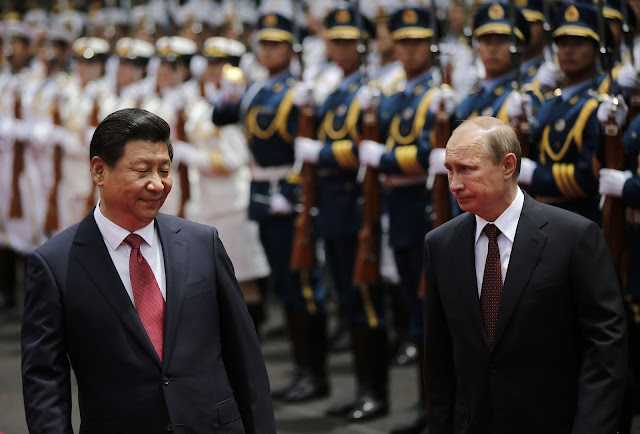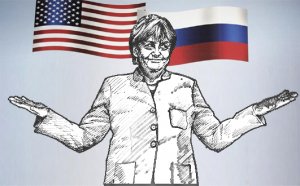
 The 70th general assembly of the United Nations that just passed will certainly be remembered as a milestone in the history of the organisation as well as in the history of international relations. The main event was of course Russia’s president Vladimir Putin’s speech, in which he declared clear massages of disagreement with the unilateralism of the United States and their allies. Besides the Russian President, similar tones were heard from the Chinese Prime Minister Xi Jinping and some other world leaders. However, this was not the first time that the voices of discontent were outspoken about the practice of unilateral surpassing the legal mechanisms of the UN by the United States and its allies or ‘vassals’ (in Zbigniew Brzezinski’s words). It was also not the first time that President Putin shared these views, though the light motive of the speech was a bit sharper than usual. If one can cite the message of the speech in a nutshell, Putin’s words "Do you realise what you have done?” would sum it up.
The 70th general assembly of the United Nations that just passed will certainly be remembered as a milestone in the history of the organisation as well as in the history of international relations. The main event was of course Russia’s president Vladimir Putin’s speech, in which he declared clear massages of disagreement with the unilateralism of the United States and their allies. Besides the Russian President, similar tones were heard from the Chinese Prime Minister Xi Jinping and some other world leaders. However, this was not the first time that the voices of discontent were outspoken about the practice of unilateral surpassing the legal mechanisms of the UN by the United States and its allies or ‘vassals’ (in Zbigniew Brzezinski’s words). It was also not the first time that President Putin shared these views, though the light motive of the speech was a bit sharper than usual. If one can cite the message of the speech in a nutshell, Putin’s words "Do you realise what you have done?” would sum it up.October 3rd, 2015 -
By: StevanGajić -Institute of European Studies -
The 70thgeneral assembly of the United Nations that just passed will certainly be remembered as a milestone in the history of the organisation as well as in the history of international relations. The main event was of course Russia’s president Vladimir Putin’s speech, in which he declared clear massages of disagreement with the unilateralism of the United States and their allies. Besides the Russian President, similar tones were heard from the Chinese Prime Minister Xi Jinping and some other world leaders. However, this was not the first time that the voices of discontent were outspoken about the practice of unilateral surpassing the legal mechanisms of the UN by the United States and its allies or ‘vassals’ (in Zbigniew Brzezinski’s words). It was also not the first time that President Putin shared these views, though the light motive of the speech was a bit sharper than usual. If one can cite the message of the speech in a nutshell, Putin’s words "Do you realise what you have done?” would sum it up.
So, what was so dramatically different between this speech and other times when Russian President shared his disagreement with the US policies in the Middle East or on other topics? Nothing really, yet it seems the balance of powers has been changed after the summit. Why is that? The answer lies on the Middle Eastern ground and sea. Before Putin even came to New York, Russian military airplanes were already parked on Syrian airstrips, and Russian battleships were in the Mediterranean, close to Syrian coast. To top of that, only two days after the speech, Russian planes started their campaign of support to the Syrian government forces against the Islamists, in order to disprove any doubts whether Russia was serious about the issue. Russia is serious in her intentions to demonstrate how military action can be undertaken within the frames of the international law. Russia will validate, not only by the power of arguments this time, but also with military muscle, that the principles behind which she stands for are just. In fact, if their actions against the so-called ISIS are proven successful, Russia will even have a rare opportunity to win an undivided support of the public opinion in the Western countries for its policy.
All of that of course did not come overnight. After the period of two decades of the ‘end of history’ and utter neo-colonial style arrogance in behaviour of the political West, that evolved to a point where our planet woke up in a political and economic nightmare. The emerging powers, as well as the most of the international community, were fed up with unilateral actions of one prevailing superpower. It is however clear now the West is no longer the only remaining ‘super-force’ – neither morally nor militarily.
From discontent to the new world order
Putin’s speech was above all a call for re-establishing the founding principles upon which the United Nations were founded and about proclaiming to the whole world that, like it or not, multi-polarity is the condition we all live in today.
All of this would be only words in the wind if not backed by military presence and economic growth of the emerging powers, but above all they would mean little if the results of the Western political decisions in the last several decades were not the following:
1.Absolute neglecting of the international law in the case of NATO’s aggression against the Federal Republic of Yugoslavia in 1999. This was done without the UN Security Council mandate and it therefore became a precedent that broke the existing international order and set up a dangerous example that was not once repeated afterwards.
2.The result of the US aggression on Iraq in 2003 made the country become practically a territory divided along sectarian lines and the most of it is controlled by the Iranian-influenced Shia Arabs.
3.The Arab spring caused a chain of events that turned the most important country of the Arab world, and a traditional US ally – Egypt an ally of Russia once again, under the rule of Field-Marshall Sisi. French Mistral helicopter carrier ships that were supposed to be sold to Russia are now going to Egypt instead, which is an illustration or a symptom of a wider shift in the Middle-East.
4.The oil rich Persian Gulf monarchies, Saudi Arabia before others, that were backing the Islamist militants in Syria, and involved in an illegal aggression on Yemen that is not going well for them, are now afraid for their own existence being aware that the so-called Islamic State, a monster they have helped create, can turn against them, while their traditional rival Iran is getting more powerful than ever, especially after the nuclear treaty. Now all of these monarchies are trying to find a common language with Moscow in a pursuit to survive in the emerging world.
5.The United States is for a variety of reasons (one of them the US becoming energy independent), leaving the Middle-East and shifting its focus to the Pacific region.
The list goes on, but these reasons are a tip of the iceberg. One way or the other, days of West’sexceptionalismand self-given moral superiority above the ‘rest’ are numbered. Other powers, before all Russia and China, showed that they are to be counted with. So the main remaining question is will the political West comply with the new state of affairs and try to find a common language with other major powers, or prolong the struggle and cause even greater chaos. The near future will provide answer to this question, therefore to say times ahead of us are going to be very interesting would be an understatement.



_jpg/250px-ElbeDay1945_(NARA_ww2-121).jpg)









